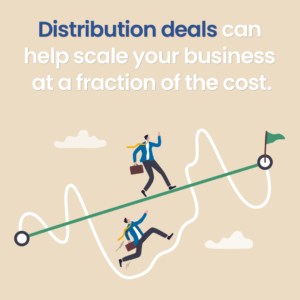A joint venture usually includes an agreement on how much each invests and what the overall marketing and sales strategy will be. Profit distribution, specific responsibilities, metrics for analyzing progress and growth, and a clarifying legal agreement are musts.
· Contracting for managing the product or service is another option. Having another organization manufacture and distribute for you can help you remain focused on refreshing and updating your product and working on new versions. Again, legal agreements should always be utilized.
· Licensing is often used as a way to enter a specific market. It is designed to assign another company to use your trademark, logo, or collateral materials and to actually manufacture and sell your product or service.
· Financial investment is often the difference between a start-up’s success or failure. Do not become so focused on building your product or service that you ignore thinking ahead and looking at all the tools you will need to access and obtain funding.
· Become a business partner with your customers or clients. Where you have similar goals, this type of partnership can offer a variety of benefits over many years. Demonstrate to them how you keep costs and fees palatable. Show you are amenable to new ideas and new ways of doing business that help both companies.








We are moving in the right direction! In 2020, both the Women Entrepreneurship Report and the African American Women Entrepreneurship Report noted that investments for women and minority-owned businesses have gone up, with total capital increasing from $5,000,000 in 2016 to 35,000,000 in 2019.
The statistics in the Women Entrepreneurship Report also showed that women and minorities are actively sourcing funding as follows:
35.38% Finding and working with small business development centers.
34.38% Incubators.
34.38% Co-working spaces.
28.13% Business accelerators.